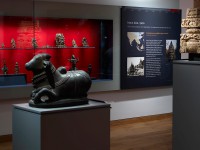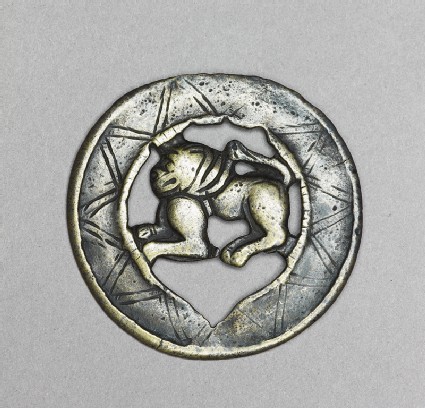Room 32 | India 600-1900 gallery
Explore Hindu, Buddhist and Jain art from India, the Himalayas and Southeast Asia.

Galleries : 299 objects
- Reference URL
Actions
Lion talismanic plaque, or tokcha
-
Details
- Associated place
- Date
- 11th century (1001 - 1100)
- Material and technique
- brass
- Dimensions
-
0.2 cm (height)
5.3 cm (diameter)
- Material index
-
processed material › metal › alloy › copper alloy › brass
- Technique index
- Object type index
- No. of items
- 1
- Credit line
- Purchased, 2000.
- Accession no.
- EA2000.29
-
Further reading
Heller, Amy, Early Himalayan Art (Oxford: Ashmolean Museum, 2008), no. 35 on p. 114, p. 25, illus. p. 114
Location
Objects are sometimes moved to a different location. Our object location data is usually updated on a monthly basis. Contact the Jameel Study Centre if you are planning to visit the museum to see a particular object on display, or would like to arrange an appointment to see an object in our reserve collections.
Galleries
Publications online
-

Early Himalayan Art
In colour and form, this tokcha with a central lion motif departs from the usual norms. Its alloy is whitish, due either to a high proportion of tin or an admixture of silver [1], and also it is not flat: the lion figure has cavities in the body on the reverse and the front has been modelled. The circular rim however is completely flat and smooth, with an incised pattern of interlocking triangles. The lower rim of the circle is worn and has been cut in an indentation. This feature and the two sideways-oriented prongs on the reverse suggest that the tokcha served as a belt buckle.
The central lion is in profile, as if poised to leap forward. He has a very full mane and his large haunches give the impression of great strength. The lion's face and fur bear no archaic markings [2]. It is therefore probable that this tokcha reflects the Tibetan adoption of the lion in its Indian Buddhist context, as the symbol of the Buddha Sakyamuni and his doctrine. Several other lion tokchas showing a similar configuration have been documented [3].
[Footnotes:]
1 See comments by John Twilley on tin and silver in alloys in west Tibet, quoted in Heller, 'The Three Silver Brothers'.
2 Compare cat. nos. 16 (confronted lions) and 18 (clasp with lions and vajra) above, for archaic Tibetan lion types.
3 Anninos, 'Tokches: Images of Change in Early Buddhist Tibet', pl. 15.
Notice
Objects may have since been removed or replaced from a gallery. Click into an individual object record to confirm whether or not an object is currently on display. Our object location data is usually updated on a monthly basis, so contact the Jameel Study Centre if you are planning to visit the museum to see a particular Eastern Art object.
© 2013 University of Oxford - Ashmolean Museum




